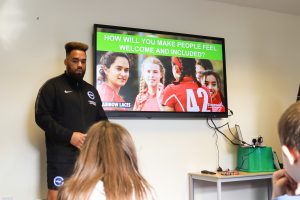Hayley’s story: why gay role models in football are so important
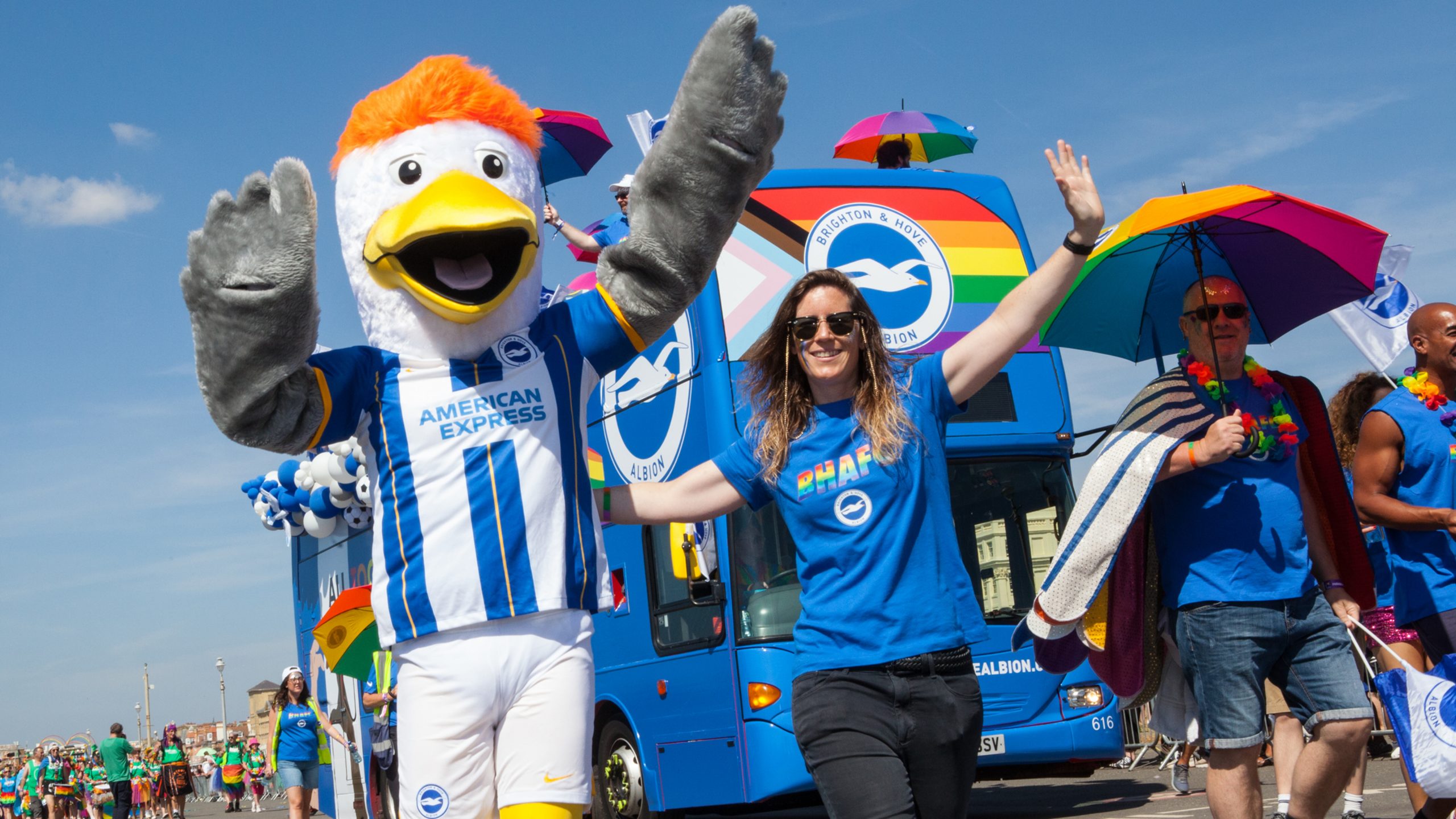
As part of LGBTQ History Month, we’re focusing on one of our amazing staff members who has been an LGBTQ+ role model at Albion in the Community for over ten years: Hayley.
Hayley has worked at Albion in the Community for more than a decade, joining the charity back in 2012.
A disability development officer at Albion in the Community, Hayley helps schools by delivering PE and sports programmes and PSHE lessons.
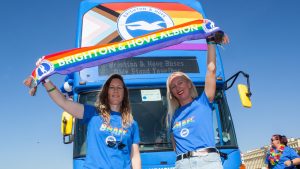
She has a long history with the beautiful game; Hayley played women’s football at a high level and even used to play for Brighton & Hove Albion Women FC.
Hayley spoke to us all about the importance of LGBTQ+ representation in football, the power of role models, and the challenges that we still have to tackle in society.
Changing attitudes through education
Much of Hayley’s day-to-day work happens in schools; she works closely with a number of Special Educational Needs schools across Sussex to help bring disability football to their pupils.
Schools, Hayley believes, are key in changing attitudes and making positive change for the future.
While most schools now have a strong focus on equality, diversity, and inclusion (EDI), it wasn’t long ago that schools were prevented by law from even talking about same-sex relationships.
Section 28 – the law effectively banning schools from talking to children or educating them about homosexuality – was only lifted in 2003 in England and Wales. Same-sex couples have only been able to get married since 2013.
You couldn’t even talk about same-sex relationships 20 years ago – now look where we are.
From what Hayley has seen, schoolchildren are becoming more educated than ever about what it means to be LGBTQ+.
“This year I delivered homophobia, biphobia, and transphobia training to a number of schools we work with. The kids took it really well,” Hayley told us.
“You couldn’t even talk about same-sex relationships 20 years ago – now you’re looking at a whole other world of people realising how broad the LGBTQ+ community actually is, and celebrating that.
“These days you’re teaching children and young people about these issues, but actually they already know so much. Because it isn’t a taboo subject that you can’t talk about, they’re so clued up.
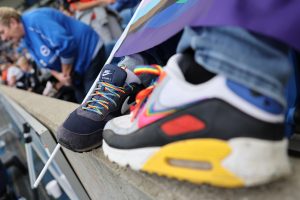
“There might even be someone in their school that’s transgender or non-binary, so now kids have a lot more awareness.
“Not everyone in society is fully onboard still, so we still have some work to do. Historically, being gay was seen as a negative thing, and some people still don’t have that full awareness that everyone’s equal.
“That’s what we’re trying to change by raising awareness from a young age in our local schools.”
How women’s football became a safe space for Hayley
After playing girls’ football as a youngster, Hayley joined the Albion Women reserve side when she was about 16. She then moved to the National Women’s Football Academy in Durham, during which time she represented Middlesbrough FC.
In the summers, Hayley would take part in a coaching programme which saw her travel all over the United States to coach young players.
She eventually found her way back to Sussex, where she played for Albion Women for two more seasons before hanging up her boots.
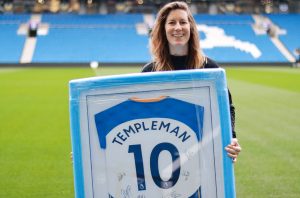
As a young player especially, Hayley wasn’t quite sure how she would be treated by other people in the game.
“As a player in women’s football [being gay] has always been quite accepted, but when you join a team you’re never too sure what to expect.
“I was born in 1981, and as a youngster I was kind of made to feel like being gay is not normal. But actually, when you’re in and around a women’s football team, you start to realise that all love is love.
“Especially as a young player, when you’re 16 or 17, you’re not really taught that everyone should be treated equally so you don’t know what the expectations are.”
Being around women’s football created a safe place where I could go and be myself.
Despite her initial nerves about being accepted in the dressing room, through women’s football Hayley had found a safe space where being gay was widely accepted.
“Being around women’s football created a safe place where I could go and be myself, and be fully accepted by the community.
“Obviously not everyone in the football team was gay, but you didn’t ever feel that you couldn’t be yourself around the other players.”
Hayley still plays football on a local level; she plays for Brighton side Seagals, a team for female and non-binary players in Brighton and Hove.
Representation and gay role models
For Hayley, having more LGBTQ+ role models in the game is an important step forward.
“For young people these days, having these role models in the game will make them feel like there’s more equality in the community,” she said.
“Years ago, someone might have felt like they couldn’t be themselves, which could lead to problems with their mental health. It could make someone more introverted and feel isolated.
“Now, being gay is something that people can be proud of and they don’t need to hide who they are, and a lot of that is down to having role models showing young people what can be possible.
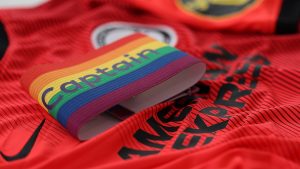
“These days I see children and young people wearing rainbow laces to support the LGBTQ+ community. Even if they aren’t gay, they show their support as an ally and that makes such a difference.”
LGBTQ+ visibility and representation is another key area that Hayley thinks will make a difference.
She believes that having visibly gay people achieving success in the football will only help more people to feel confident that football is for them.
“Having representation in all forms is important. LGBTQ representation is more common in women’s sport than in men’s, but seeing any sports people on the TV promoting and supporting the gay community will show younger people they don’t need to hide.
Everyone should be treated equally, and there should be a platform for anyone who’s gay to be able to go to a football team and play football.
“Visibility is really important because there are still people in society that don’t cross paths with someone who might be gay. There are people that don’t have that education, and still feel like it’s not normal and shouldn’t be accepted.
“The more we can do, both in the women’s and the men’s game, the better for young people.
“Everyone should be treated equally, and there should be a platform for anyone who’s gay to be able to go to a football team and play football, and it be totally accepted.
“We need to challenge people’s perceptions to make them realise that being gay is something that’s normal, and should be accepted and celebrated.”
How Albion in the Community are making a difference
Promoting equality, diversity and inclusion is an important area of our work.
We work with Stonewall, the Premier League, the club, and other partners to promote inclusion and to help children, young people, and schools to understand the importance of LGBTQ+ inclusion in sports.
Throughout the year we run events and workshops to promote the importance of allyship, and building relationships of trust and empathy with marginalised individuals or groups of people.
Hayley says she’s happy to work somewhere that’s connecting with the local LGBTQ+ community.
“Last year I was part of the Brighton Pride parade, which was an amazing experience,” she said.
“There were loads of us at the parade with the Albion bus, showing the city that Brighton & Hove Albion is a club that wants to support the local LGBTQ+ community. That’s really important.
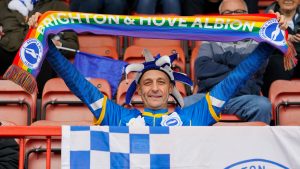
“We’ve done a lot of work with the local community to try and raise awareness and show solidarity. I know in the past we’ve invited gay footballers in the local area to come and watch a game, to show them that the Amex is a safe place and that the club has zero tolerance on homophobia.
“Some people might never have been to watch a game because they’re worried about abuse they could get, and it’s up to us to show them that the Albion is a safe space and doesn’t tolerate that behaviour. It’s something that we as a club do very well.
“From the charity side, we do loads of workshops to raise awareness.
“Every year we deliver Rainbow Laces workshops, which the kids always love and take to heart. Plus they love wearing the rainbow laces and wearing them to show they’re proud to be an ally!”
Find out more about how we help tackle discrimination: https://bhafcfoundation.org.uk/community-wellbeing/reducing-inequality/tackling-discrimination/
This story was written when our name was Albion in the Community. As of August 1 2023, we are the Brighton & Hove Albion Foundation.


